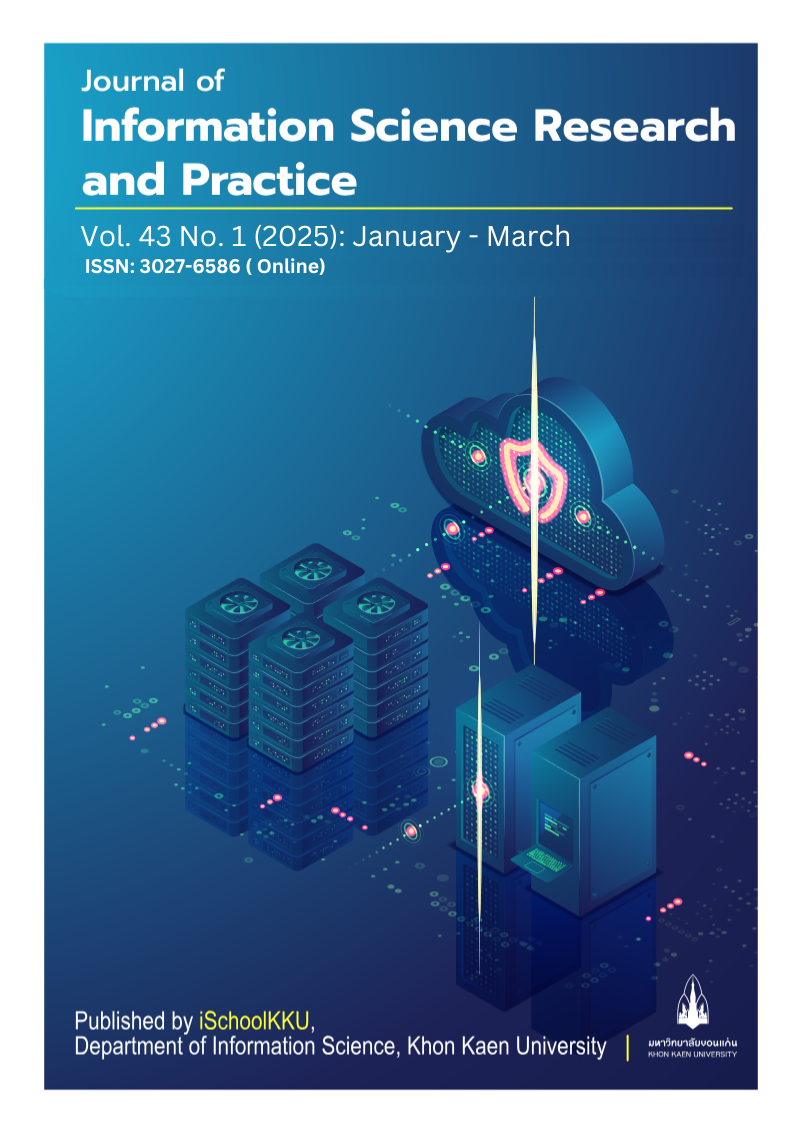กรอบคิดและทิศทางมนุษยศาสตร์ดิจิทัลไทยในท่ามกลางความหลากหลาย
DOI:
https://doi.org/10.14456/jiskku.2025.8คำสำคัญ:
มนุษยศาสตร์ดิจิทัล , การจัดการข้อมูลวิจัย , การสื่อสารทางวิชาการบทคัดย่อ
บทความปริทัศน์เชิงสังเคราะห์นี้นำเสนอการวิเคราะห์กรอบคิดและทิศทางของมนุษยศาสตร์ดิจิทัลในบริบทของไทย ผ่านการพิจารณาจากผลการศึกษาของโครงการวิจัย “วิธีมนุษยศาสตร์ดิจิทัลไทย: กรอบคิดและทิศทาง” โดยมุ่งอภิปรายประเด็นสำคัญสามประการ ได้แก่ ความจำเป็นในการกำหนดกรอบคิดและทิศทางเฉพาะสำหรับมนุษยศาสตร์ดิจิทัลไทย ความเป็นไปได้ในการนำกรอบคิดจากบริบทสากลมาปรับใช้ และแนวทางการพัฒนากรอบคิดที่เหมาะสมกับบริบทของไทย นอกจากนี้ ยังวิเคราะห์สถานภาพปัจจุบันของมนุษยศาสตร์ดิจิทัลไทยในมิติต่าง ๆ ทั้งด้านผลงานทางวิชาการ ข้อมูลการวิจัย แนวคิดเชิงวิพากษ์ และโครงสร้างพื้นฐาน ผลการสังเคราะห์ชี้ให้เห็นว่า แม้การพัฒนามนุษยศาสตร์ดิจิทัลไทยจะมีความก้าวหน้าในระดับหนึ่ง แต่ยังมีความท้าทายสำคัญในการสร้างสมดุลระหว่างการรับเอาแนวคิดสากลมาปรับใช้และการพัฒนากรอบคิดที่ตอบสนองต่อบริบทเฉพาะ รวมถึงการพัฒนาโครงสร้างพื้นฐานและกลไกสนับสนุนที่จำเป็นต่อการเติบโตในระยะยาว
Downloads
เอกสารอ้างอิง
Berry, D. (2011). The computational turn: Thinking about the digital humanities. Culture Machine, 12, 1–22.
Bod, L. W. M. (2013). Who's afraid of patterns? The particular versus the universal and the meaning of humanities 3.0. BMGN - Low Countries Historical Review, 128(4), 171–180.
Buranarach, M., Supnithi, T., Thein, Y. M., & Ruangrajitpakorn, T. (2016). OAM: An ontology application management framework for simplifying ontology-based semantic web application development. International Journal of Software Engineering and Knowledge Engineering, 26(1), 115–145. https://doi.org/10.1142/S0218194016500066
Cheang, W. F. (2023). Digital humanities, identity and a made-in-Taiwan laptop computer. 2023 Pacific Neighborhood Consortium Annual Conference and Joint Meetings (PNC). (15–21). Okinawa, Japan: Curran Associates. https://doi.org/10.23919/PNC58718.2023.10314979
Choemprayong, S., & Chintakovid, T. (2024). Phromdean manutsaya sattra di chi than Thai: kæroi chumchon lae phon ngan thang wichakan baep saha sakha wicha [Boundaries of digital humanities in Thailand: Tracing multidisciplinary scholarly communities and works]. (In Thai). Program Management Unit for Human Resources & Institutional Development, Research and Innovation (PMU-B).
Courtright, C. (2007). Context in information behavior research. Annual Review of Information Science and Technology, 41(1), 273–306. https://doi.org/10.1002/aris.2007.1440410113
Curry, S. H. (2008). Translational science: Past, present, and future. BioTechniques, 44(2S), 2–8. https://doi.org/10.2144/000112749
Dalbello, M. (2011). A genealogy of digital humanities. Journal of Documentation, 67(3), 480–506. https://doi.org/10.1108/00220411111124550
European Science Foundation. (2011). European Science Foundation archives. Retrieved from http://archives.esf.org/media-centre/esf-in-the-media/archives-2011.html
Gold, M. K. (Ed.). (2012). Debates in the Digital Humanities. University of Minnesota Press. Retrieved from https://dhdebates.gc.cuny.edu/projects/debates-in-the-digital-humanities
Holasut, M. (2022). So ong sapha wa di chi than satawat thi yisipet phan wae nawa ra ron kam [Exploring the Digital State of the 21st Century Through the Lens of Literature]. (In Thai). Bangkok: Sayam.
Kaltenbrunner, W. (2017). Digital infrastructure for the humanities in Europe and the US: Governing scholarship through coordinated tool development. Computer Supported Cooperative Work, 26(3), 275–308. https://doi.org/10.1007/s10606-017-9272-2
Kirdnark, T. (2024). Phonlawat haeng 'khwammai' lae phatthanakan khong ongkhwamru thang manutsayasat di chi than [The Dynamics of “Meaning” and the Development of Knowledge in Digital Humanities]. (In Thai). Bangkok: Siamparitut.
Klungthanaboon, W. (2024). Kan baengpan khomun wichai phainai chumchon wichakan thang dan manutsayasat di chi than: kansamruat saphap kan patchuban [Research data sharing among digital humanities scholars: A survey on current situation]. (In Thai). Program Management Unit for Human Resources & Institutional Development, Research and Innovation (PMU-B).
Levine, G., Brooks, P., Culler, J., Garber, M., Kaplan, E., & Stimpson, C. (1988). Speaking for the Humanities. American Council of Learned Societies. Retrieved from https://www.acls.org/wp-content/uploads/2021/11/Occasional_Paper_007_1989.pdf
Longxi, Z. (2011). The Humanities: Their Value, Defence, Crisis, and Future. Diogenes, 58(1-2), 64–74. https://doi.org/10.1177/0392192112448338
Mahony, S. (2018). Cultural diversity and the digital humanities. Fudan Journal of the Humanities and Social Sciences, 11(3), 371–388. https://doi.org/10.1007/S40647-018-0216-0
Nyhan, J., & Flinn, A. (2016). Computation and the humanities: Towards an oral history of digital humanities. Switzerland: Springer Nature.
Pawlicka-Deger, U. (2021). Digital humanities and a new research culture: Between promoting and practicing open research data. In R. Mann & S. Hawkins (Eds.), Access, control, and dissemination in digital humanities (40-57). London, UK: Routledge.
Rockwell, G. (2007). An alternate beginning to humanities computing. Theoreti.ca. Retrieved from https://theoreti.ca/?p=1608
Schriebman, S., Siemens, R., & Unsworth, J. (Eds.). (2004). A Companion to Digital Humanities. Malden, MA, USA: Blackwell Publishing Ltd. https://doi.org/10.1002/9780470999875
Smithies, J. (2017). The Digital Humanities and the Digital Modern. In Palgrave Macmillan UK eBooks. Palgrave Macmillan. https://doi.org/10.1057/978-1-137-49944-8
Spiro, L. (2012). “This is why we fight”: Defining the values of the digital humanities. In M. K. Gold (Ed.), Debates in the digital humanities. Minneapolis, MN: University of Minnesota Press. Retrieved from https://dhdebates.gc.cuny.edu/read/untitled-88c11800-9446-469b-a3be-3fdb36bfbd1e/section/9e014167-c688-43ab-8b12-0f6746095335
Su, F. (2020). Cross-national digital humanities research collaborations: structure, patterns and themes. Journal of Documentation, 76(6), 1295-1312. https://doi.org/10.1108/JD-08-2019-0159
Su, F., Li, S., Liu, Q., & Zhang, Y. (2023). A bibliometric study of digital humanities research in China from 2012 to 2021. Information Research, 28(4). https://doi.org/10.47989/ir284336
Su, F., Zhang, Y., & Immel, Z. (2021). Digital humanities research: interdisciplinary collaborations, themes and implications to library and information science. Journal of Documentation, 77(1), 143-161. https://doi.org/10.1108/JD-05-2020-0072
Sula, C. A., & Hill, H. V. (2019). The early history of digital humanities: An analysis of Computers and the Humanities (1966–2004) and Literary and Linguistic Computing (1986–2004). Digital Scholarship in the Humanities, 34(Supplement_1), i190–i206. https://doi.org/10.1093/llc/fqz015
Svensson, P. (2016). Humanities computing as digital humanities. In B. Terras, J. Nyhan, & E. Vanhoutte (Eds.), Defining digital humanities (159–186). New York, NY: Routledge.
Tang, M.-C., Cheng, Y. J., & Chen, K. H. (2017). A longitudinal study of intellectual cohesion in digital humanities using bibliometric analyses. Scientometrics, 113(2), 985-1008. https://doi.org/10.1007/s11192-017-2496-6
Terras, M. (2013). Disciplined: Using educational studies to analyse ‘humanities computing’. In B. Terras, J. Nyhan, & E. Vanhoutte (Eds.), Defining Digital Humanities (1st ed.). Routledge. https://doi.org/10.4324/9781315576251
Tsui, L. H. (2020). Charting the emergence of the digital humanities in China. In K. K. Y. Chan & C. S. G. Lau (Eds.), Chinese culture in the 21st century and its global dimensions (Vol. 2). Springer. https://doi.org/10.1007/978-981-15-2743-2_12
Tuamsuk, K., et al. (2018). Digital humanities research. (In Thai). Khon Kaen: Faculty of Humanities and Social Sciences, Khon Kaen University.
UCL Grand Challenges. (2022) An Enquiry on the Case for the Humanities: Preliminary Findings. https://doi.org/10.14324/000.rp.10144511
van Zundert, J. (2012). If you build it, will we come? Large scale digital infrastructures as a dead end for Digital Humanities. Historical Social Research, 37(3), 165–186. https://doi.org/10.12759/hsr.37.2012.3.165-186
Wang, Q. (2018). Distribution features and intellectual structures of digital humanities. Journal of Documentation, 74(1), 223-246. https://doi.org/10.1108/JD-05-2017-0076
Zhang, L. (2011). The humanities: Their value, defence, crisis, and future. Diogenes, 58(1), 64–74. https://doi.org/10.1177/0392192112448338







